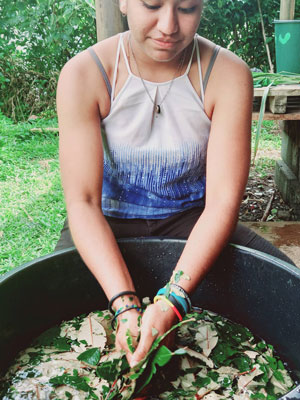Building sustainable futures with traditional knowledge in New Caledonia
| Author | Rebecca Ferderer |
| Position | Traditional Knowledge Division, WIPO |
The passionate Kanak scientist discusses the significance of her work in supporting the livelihoods of Indigenous groups, and her ambition to help develop a sui generis legal framework that protects the archipelago’s traditional knowledge while ensuring Indigenous communities are able to share equitably in the benefits of its use.
More than 90 percent of the species in the terrestrial, plant and maritime environment are endemic to the islands of New Caledonia,” notes Subama Mapou. “Local Indigenous Peoples have developed a broad knowledge of more than 1,200 species of plant, according to a bibliographic study I conducted as part of my research,” she adds. (Photo: Quentin Fahrner / Unsplash)
How did you get into plant biology?
I have always been interested in plants. Knowledge of medicinal plants and their use was passed down to me from members of my family, including my great-grandfather, Ouma Mapou, a 109-year-old traditional healer, and my grandmother. My university studies in plant and micro-biology are part of a promise to my family to continue their valuable research on plant-based traditional knowledge, including its protection and transmission to future generations. At present, I am working on my PhD in phytochemistry and ethnopharmacology at the University of New Caledonia. My aims are to support the sustainable management of New Caledonia’s natural resources, to enhance the use of the archipelago’s traditional knowledge, and to help establish a sui generis legal framework that protects the traditional knowledge of our Indigenous populations and ensure they can access and share in the benefits of its use in a sustainable and fair manner.
As humans, we need to respect and listen to Mother Nature. I hope we change the way we consume. Our children’s future well-being depends on it.
What is so appealing about working with New Caledonia’s natural resources?
What fascinates me most about working with New Caledonia’s natural resources is the archipelago’s rich biodiversity and the wealth of traditional knowledge surrounding its use. More than 90 percent of the species in the terrestrial, plant, and maritime environment are endemic to the islands. Local Indigenous Peoples have developed a broad knowledge of more than 1,200 species of plant, according to a bibliographic study I conducted as part of my research.
Tell us more about the importance of traditional knowledge to Kanak communities
 The workshops organized by Subama Mapou and her
The workshops organized by Subama Mapou and her
team are rekindling traditional knowledge-based
practices among women and men, enabling them to
build skills in traditional handicrafts, as well as fishing
and hunting practices.
(Photo: Courtesy of Subama Mapou)
Archaeological remains show that the Kanak people have been present in New Caledonia for 4,000 years. New Caledonia is divided into eight customary areas with 28 Indigenous languages. The islands’ unique taxonomic groups are reflected in the local knowledge that each group holds on traditional plant-based uses. Developed over centuries, this knowledge has been transmitted orally from generation to generation by traditional practitioners like my great-grandfather.
The preamble to the Charter of the Kanak People states that “the Melanesian populations, like other Indigenous Peoples in the world, have a vision of the cosmos, a relationship to space, a social organization and a customary practice which tend to a permanent search of balance and harmony.” This vision of the relationship between Indigenous Peoples and their natural environment is what gives them the capacity to be...
To continue reading
Request your trial
